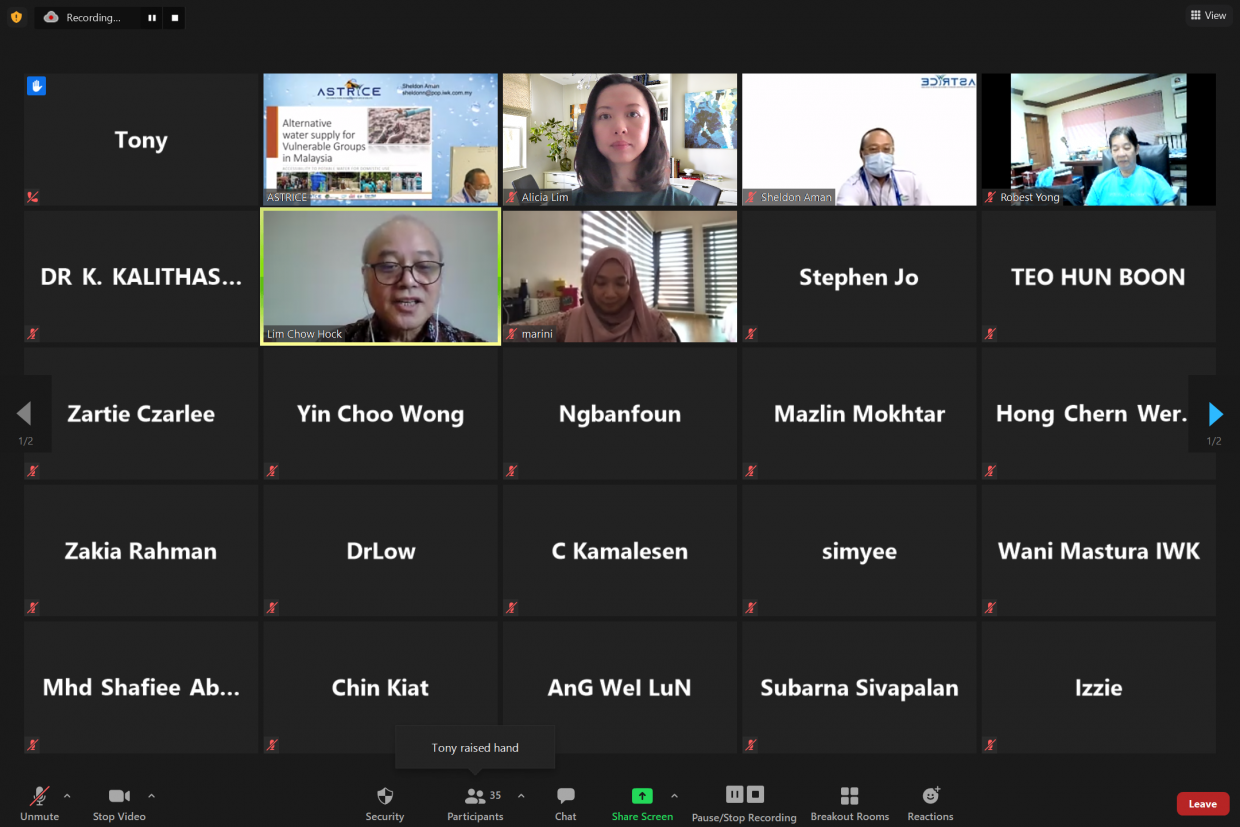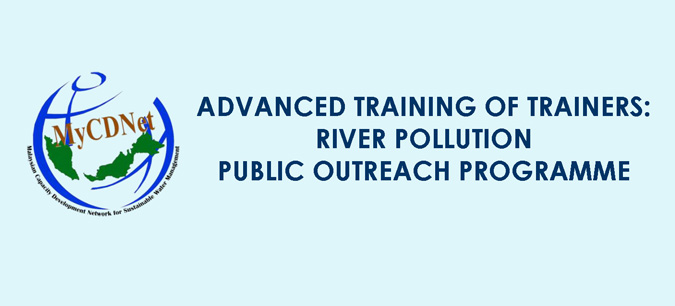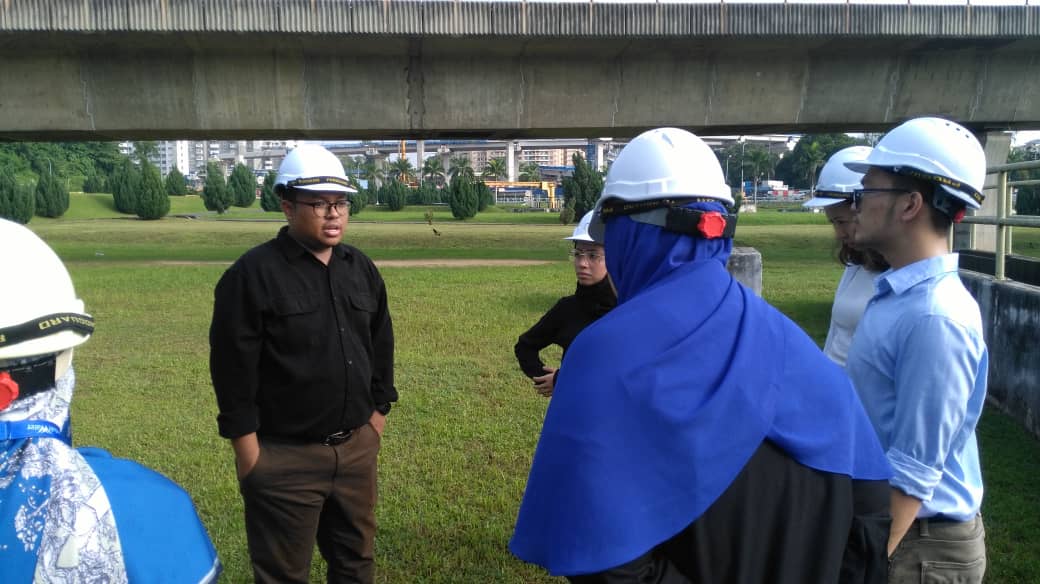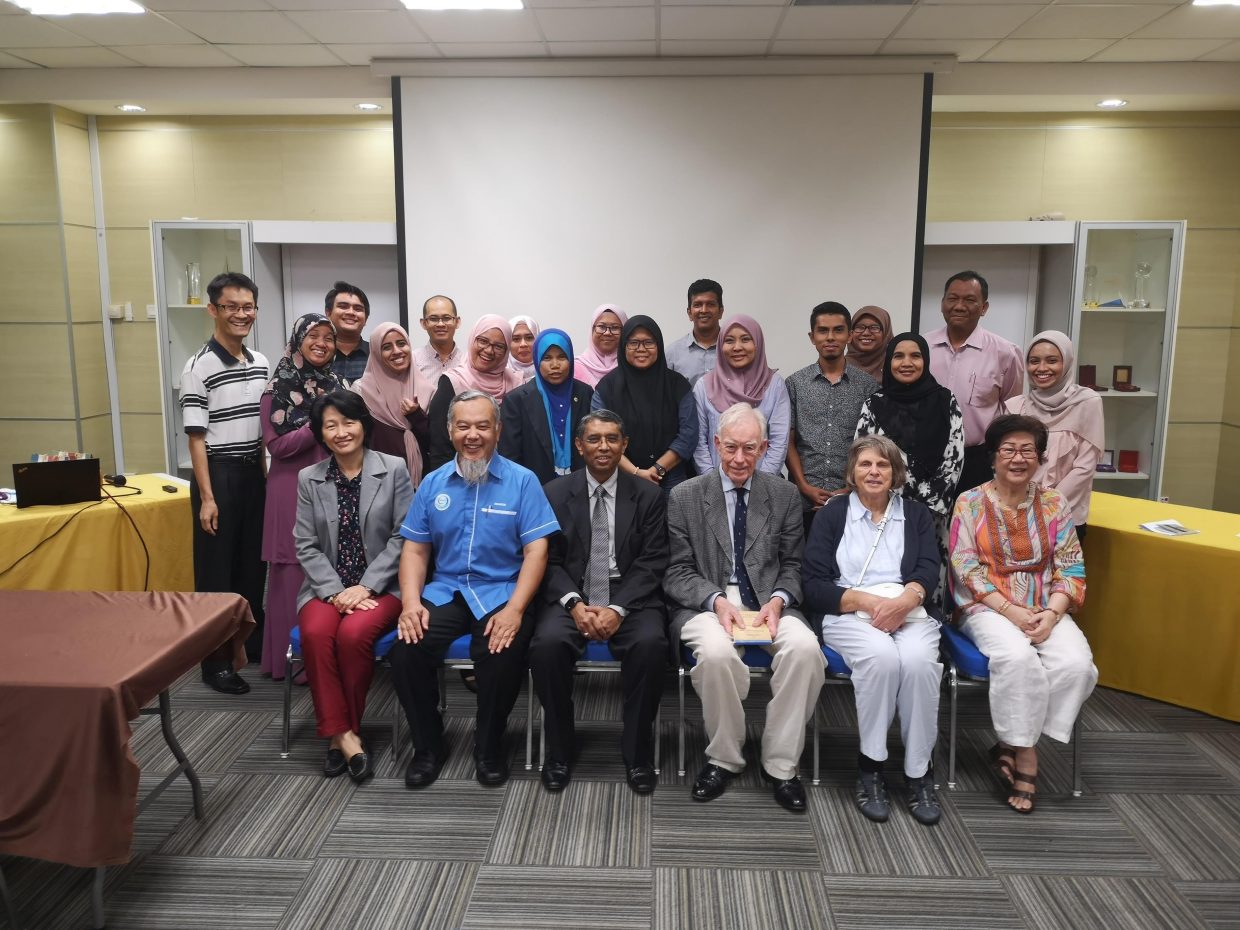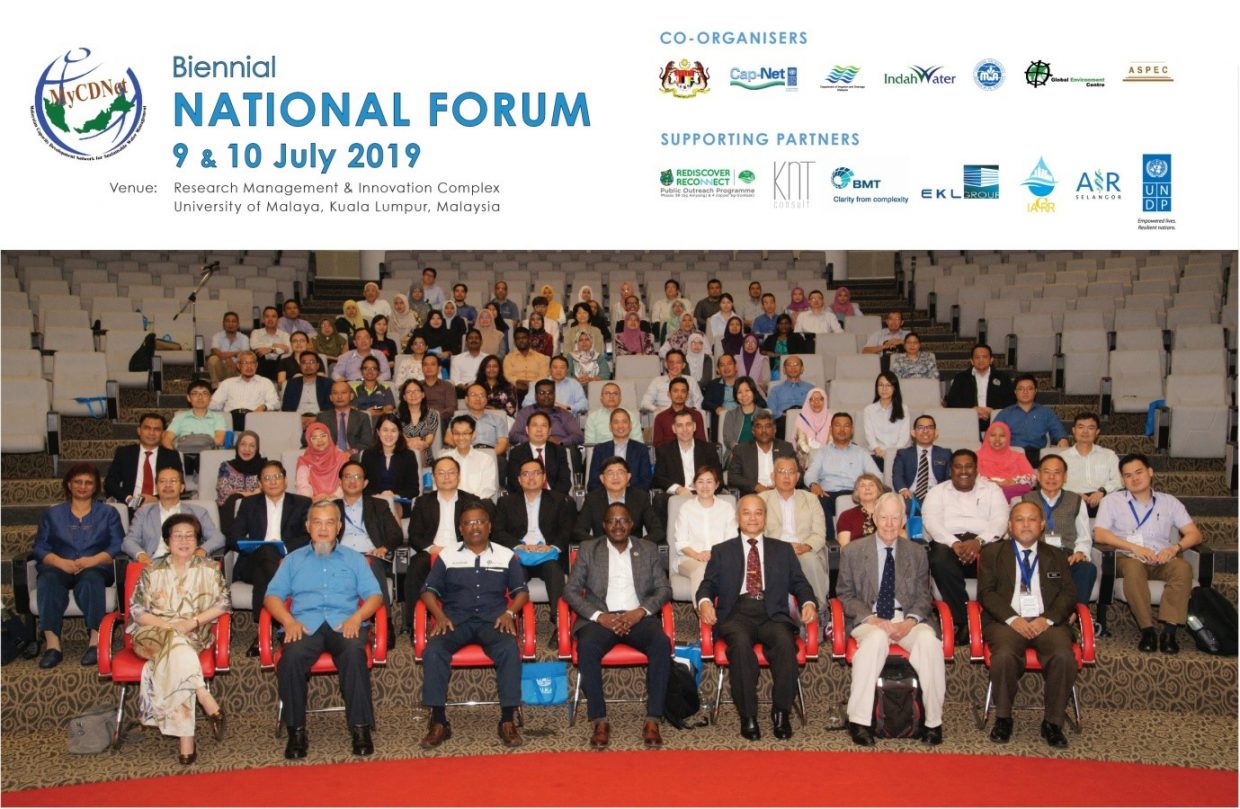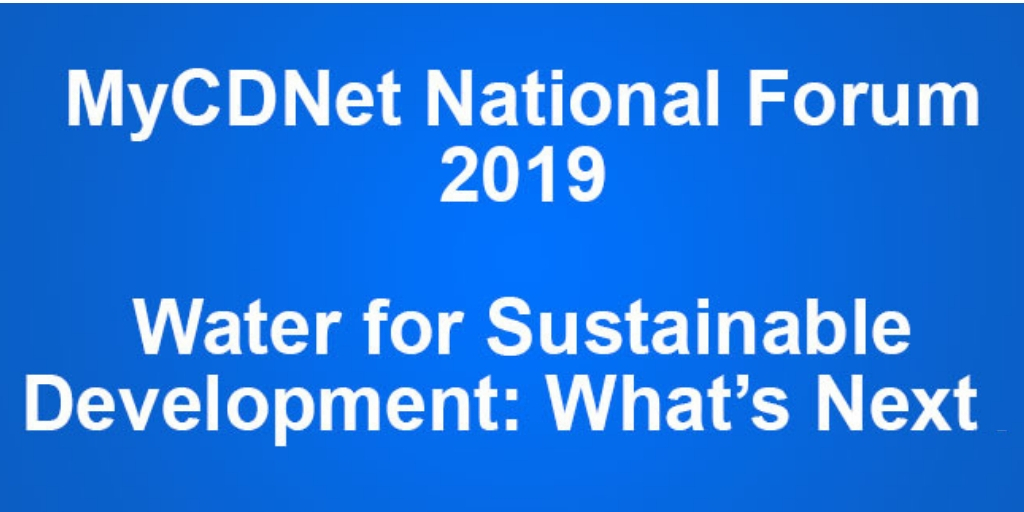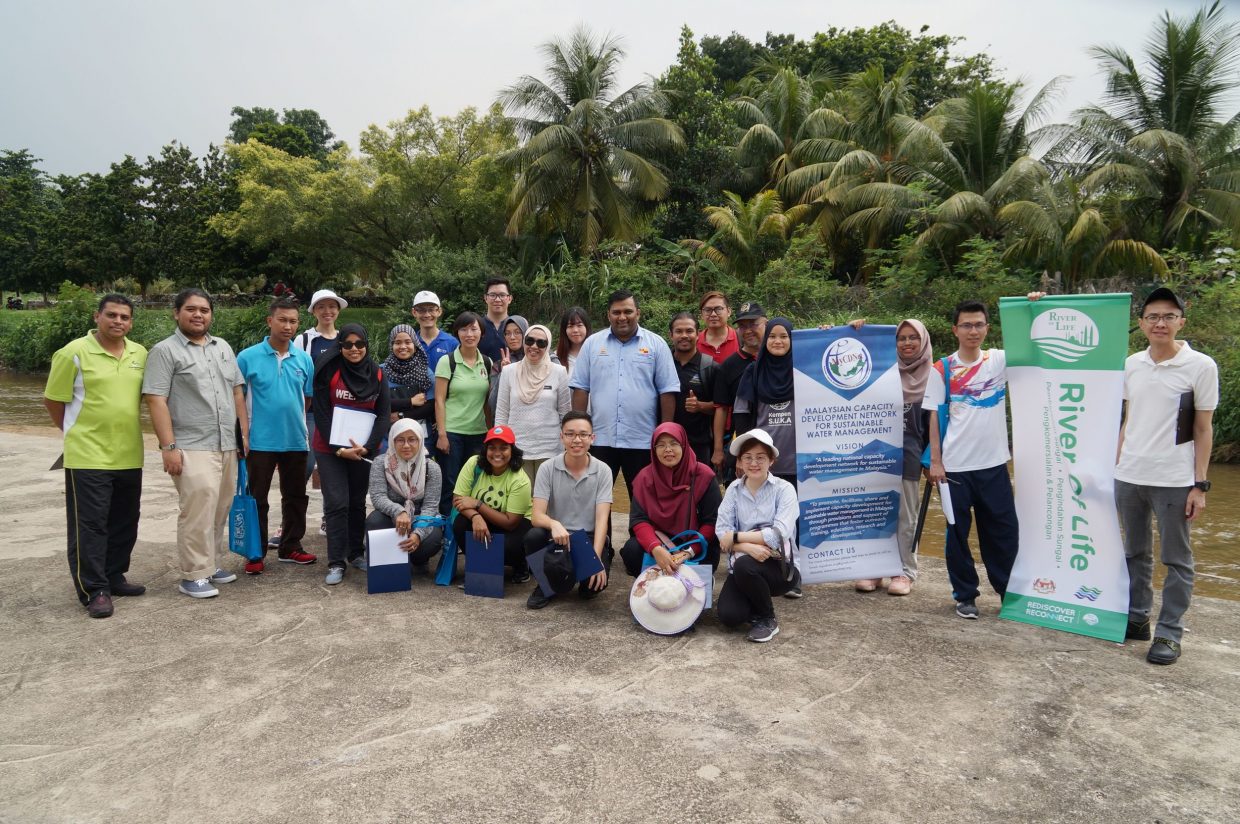BIENNIAL NATIONAL FORUM 2023
Climate Change Impact on Water Resources in Malaysia – Role of Capacity Development



The Malaysian Capacity Development Network for Sustainable Water Management (MyCDNet) successfully organised and carried out its Biennial National Forum 2023 on 17 August at National Water Research Institute of Malaysia (NAHRIM), Selangor, with the theme Climate Change Impact on Water Resources in Malaysia – Role of Capacity Development. The Forum commenced with the Welcoming Address by MyCDNet’s Network Manager, Yang Berbahagia Dato’ Ir. Lim Chow Hock, who spoke about MyCDNet and its commitment to capacity building.

The Forum was divided into two sub-themes comprising three paper presentations for Sub-theme 1 and an open forum session for Sub-theme 2, with a panel Q & A segment after each sub-theme. There was one Keynote Address before each sub-theme in this full-day event. The speakers, moderators, panellists and paper presenters were hand-picked specialists in the chosen topics. Based on participants’ responses and comments, the Forum was very well organised with contents that were valuable, insightful and beneficial to their overall learning objectives.
The morning session started with Keynote Address I by Dr. Ching Thoo A/L Kim, Deputy Secretary General (Water & Sewerage) at the Ministry of Natural Resources, Environment and Climate Change. It was presented by Ir. Mohd Zaki bin Mat Amin, Director General of NAHRIM, on mapping the trajectory for water-climate nexus in Malaysia, in terms of water planning, policy and building capacity in water management with the national agenda of transforming the water sector into a dynamic economic sector.

There were three paper presentations for Sub-theme 1 on Current CCA & Water Progress in Malaysia: Science, Policy and Implementation, chaired by Ir. Hj. Md Khairi Selamat, MyCDNet’s Deputy Network Manager.

Paper 1 – “Modelling to Better Understand the Past, Current and Future Climate in Malaysia” by Dr. Liew Ju Neng, Assoc. Prof., Universiti Kebangsaan Malaysia (UKM), highlighted the importance of modelling climate change projection as the way forward. He emphasized the need for understanding the uncertainties in the global climate models (GCMs). Hence, for future rainfall projections in Malaysia (Peninsular), it is crucial to consider the spatial and seasonal differences. Lastly, his study concluded that draught occurrence seemed linear to warmer temperature levels.
Paper 2 – “Adaptation in Malaysia: Mainstreaming for Water Resources” by Ms. Aznie Rahim, Principal Assistant Secretary, Ministry of Natural Resources, Environment and Climate Change (NRECC), highlighted the need for managing risks for proactive adaptation to climate change, and stressed on the fact that ‘climate crisis is water crisis’ and there is less investment in the water sector unlike the energy sector. The two main action steps are mainstreaming (climate policy integration) and capacity development framework, and both need the people to be accountable and empathetic.
Paper 3 – “Climate Smart Water Supply Services from a Regulatory Perspective” by Ms. Loga Sunthri Veeraiah, National Water Services Commission (SPAN), talked about their adaptation and climate change mitigation plan for ensuring resilience in water along with the challenges faced and how they are being addressed. SPAN war room for making data available, tariff setting initiative, Welps scheme, central water reclamation point for industrial reuse, exploring alternative energy sources, introducing waste to wealth schemes are some of the notable undertakings by SPAN. Also the need for setting KPI specific to emissions, and proactive actions and a sense of shared responsibility among the team members, were highlighted.
The engaging panel Q & A session highlighted the need for advocacy, governance and step-wise adaptations in decision making process related to climate change action. Also, the relevance of communication of climate change data for public awareness was emphasized, as it’s crucial to get everyone engaged for a precautionary approach and to prepare for the worst. The Q & A session was followed by lunch break.

Prof. Emeritus Tan Sri Dr. Zakri Abdul Hamid kicked off the afternoon session with his motivating Keynote Address titled “Understanding the Past, Identifying Gaps and Addressing Future Challenges” that reviewed the impact and mechanisms of the Kyoto protocol as it was the most influential climate change action taken so far that inspired a global undertaking to reduces GHGs. The importance of Paris climate accords were highlighted as well, in encouraging global action, because climate change impact affects everyone and calls for global action. He further talked about the COP 27 takeaways, and highlighted the Malaysian climate position and the top Malaysian negotiators in history. The current Malaysian efforts and future expectations were pointed out as well, followed by an invitation to look out for the event ‘From WORLD WATER WEEK to COP 28’ on 24th August 2023.
Following the Keynote Address II, Moderator Prof. Emeritus Dato’ ChM Dr. Mazlin Mokhtar began the Expert Panel Session discussing climate change action (CCA) and water progress in Malaysia in terms of science, policy and implementation, water and climate nexus, climate change mitigation, adaptation & implementation in water resource management, and how can water participate in COP28. It was a dynamic session with the five panellists giving a 5-minute presentation each, followed by a lively discussion and Q & A session with the participants.

Ms Marina Yong from Air Selangor, added on the importance of governance and finance besides science in public welfare decisions. She advocated for the introduction of increasing water tariff to contribute to a more efficient water management system to help mitigate future situations of water cut-down. She emphasized the call for action to switch from current water taps to water saving taps as an investment to conserve water. Next, Ir. Azman bin Mat Jusoh from NAHRIM presented on their action steps of adaptation to mitigate climate change impacts and promoted their commercial potable rainwater.
Dr. Fatimah Ahamad from Sunway Centre of Planetary Health highlighted the need for including businesses in the climate change action journey. She shared her insights in the power of education and technology to create the future generation to better handle the climate change impacts. She also emphasized the need for connecting the dots by communicating the success stories to the community and building community trust with the governance, to proactively tackle climate change together. Then, Mr. Rahman Hussin of Imperium Consulting Asia raised the need for awareness of policy loopholes and the delay in action for passing a bill that could be very urgent to tackle climate change. Existing political interests and benefits can hinder the climate change action progression. Hence, balancing political reality to encourage swift progressive policies is a valuable key takeaway from his speech. Lastly, Mr Faizal Parish from Global Environment Centre (GEC) talked about the role of capacity development from an NGO’s perspective. He highlighted their initiatives for river care, forest and coastal protection, better water management suggestions for Malaysian peat lands, and community based outreach programs for disaster risk management.
After a quick summary of the Forum by the event Rapporteur, Ms. Amina Tahreen, the closing remarks were presented by Forum Chair Ir. Hj. Md Khairi Selamat.
MyCDNet thanks NAHRIM for the venue, the sponsors, speakers, rapporteur, participants and LUAS for their contribution, time, energy and support in making this Forum a success!
Note: The full collection of photos can be viewed at https://drive.google.com/drive/folders/1itkeLP_UtsHQNL46Qt6FMhlpYQPNjGJb?usp=drive_link
- Published in Environment, Outreach, Past Events
Climate-Resilient Water Management for the Future: Flood & Drought
The Malaysian Capacity Development Network for Sustainable Water Management (MyCDNet) successfully organised the Climate-Resilient Water Management for the Future: Flood & Drought webinar on 29 July 2021. Hosted by Asian Sewerage Training, Research & Innovation Centre of Excellence (ASTRICE) and supported by Cap-Net UNDP, the event drew more than 100 participants.
It was a lively knowledge-sharing session focused on water management during flood and drought from the perspectives of the National Flood Forecast & Warning Centre (PRABN) and the National Water Balance Management System (NAWABS).
Network Manager of MyCDNet Dato’ Ir Lim Chow Hock opened the webinar with welcoming remarks and an introduction of MyCDNet and Cap-Net UNDP. The webinar was moderated by Ir. Hj. Md Khairi bin Selamat, Deputy Network Manager of MyCDNet, who was the Director of the River Basin Management Division of the Department of Irrigation & Drainage Malaysia.

(Photo caption: Moderator Ir. Hj. Md Khairi bin Selamat, Deputy Network Manager of MyCDNet)
The prominent speakers were Ir. Dr. Mohd Zaharifudin bin Muhamad Ali, Principal Assistant Director for PRABN, and Ir. Dr. Asnor Muizan Ishak, Chief of Section for Technical Advice for NAWABS. Both are water management system under the Department of Irrigation & Drainage Malaysia.

(Caption: Ir. Dr. Mohd Zaharifudin bin Muhamad Ali, Principal Assistant Director for PRABN)

(Caption: Ir. Dr. Asnor Muizan Ishak, Chief of Section for Technical Advice for NAWABS)
Feedbacks and comments from participants were very positive with suggestions to carry out more webinars with similar scope. For the majority, the content was interesting and eye-opening.
Training slides are available under Resources – Training Slides – MyCDNet.
Replay:
- Published in Environment, Outreach, Past Events
Alternative Water Supply for Vulnerable Groups in Malaysia
The Malaysian Capacity Development Network for Sustainable Water Management (MyCDNet) and Indah Water Konsortium Sdn Bhd (IWK) successfully co-organised the webinar titled “Alternative Water Supply for Vulnerable Groups in Malaysia”. Held on 2 June 2021, the event was hosted by Asian Sewerage Training, Research & Innovation Centre of Excellence (ASTRICE), and in partnership with National Water Research Institute of Malaysia (NAHRIM), Global Environment Centre (GEC) and EFINITY Social Enterprise. The webinar was supported by Cap-Net UNDP.
This webinar aimed to create awareness on challenges faced by Vulnerable Groups in Malaysia for potable water supply. The two-hour online seminar illustrated some current solutions for providing clean water to vulnerable groups in the event of water disruptions or unavailability of piped water from the treatment plants. The objective was to highlight alternatives for these groups to gain access to potable water for domestic use. We hoped that through this seminar, the participants will be able to better utilise their talents, skills and resources in advancing communal practice of water use, within and outside of their organisation.
Network Manager of MyCDNet Dato’ Ir Lim Chow Hock opened the webinar with welcoming remarks and an introduction of MyCDNet and Cap-Net UNDP. The webinar was moderated by Mr Sheldon Boyd Aman from ASTRICE.

The first speaker, Mr Robest Yong from EFINITY Social Enterprise, presented “Making Potable Water” with an innovative, simple, portable filtration system that is used in many hard-to-reach areas within Malaysia as well as the Asian region. After a brief Q&A session with Mr. Yong, Dr. Kalithasan Kailasam from Global Environment Centre gave a comprehensive presentation on the available types of alternative water sources, and case studies of projects focused on conserving water resources and supply for communities. There was a Q&A session with Dr. Kalithasan before the final speaker. Ir. Marini Mohamad Ideris gave the participants an in-depth look into the R&D initiatives on rainwater harvesting system by NAHRIM. Extra time was allowed for Q&As and comments by participants before the Moderator closed the webinar session



Feedbacks and comments from participants were very positive with good suggestions and recommendations. For the majority, the course offered new perspectives and new contents.
View Course Material
- Published in Environment, Outreach, Past Events
TRAINING OF TRAINERS ON RIVER POLLUTION PUBLIC OUTREACH PROGRAMME – ADVANCE LEVEL
The Malaysian Capacity Development Network for Sustainable Water Management (MyCDNet) organized and conducted the Training of Trainers on River Pollution Public Outreach Programme – Advance Level on 5 – 6 August 2020. As a way forward in the current pandemic situation, the TOT was MyCDNet’s first hybrid programme where the first day was a webinar on Zoom platform and the second day was a site visit in the Klang River Outdoor Classroom, which was limited to only 30 people.
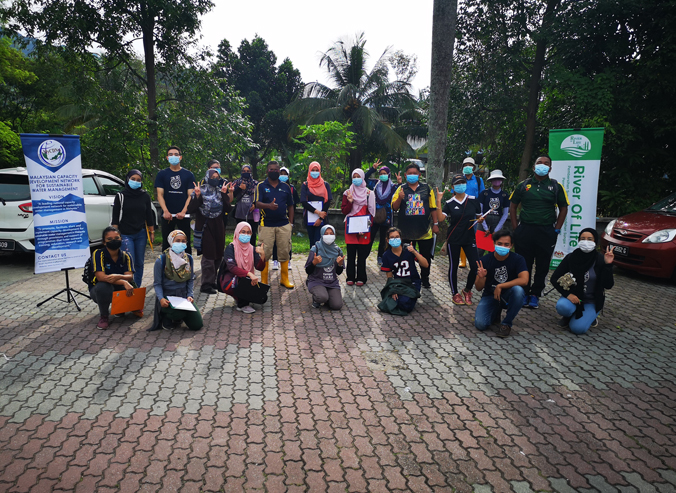
This TOT was carried out in collaboration with Global Envitronment Centre (GEC) and Asia Pacific Environmental Consultants (ASPEC), with support from Cap-Net UNDP to capacity build water professionals, capacity builders, local authorities’ and others on public outreach programmes to monitor and prevent river pollution through effective stakeholder engagement, equipping them with knowledge on river monitoring, pollution mapping, river auditing, and pollution mitigation utilising current technologies.
On the first day, Dato Lim Chow Hock, the Network Manager of MyCDNet opened the webinar session, while GEC moderated and hosted the webinar. There were four paper presentations. Module 1 – Rivers and Its Current Status was presented by by Ir Noor Aishah Zaharin from the Department of Irrigation & Drainage Malaysia, highlighting the current water quality status and current pollution scenarios in Malaysia. Module 2 – River Pollution Management/Mitigation was presented by Mr Mazhazuan Bin Harun of LUAS who highlighted examples of pollution mitigation measures undertaken by LUAS in Selangor, and by Ms Pavitra from TechKem who provided an insight into advanced technologies available in Malaysia in ensuring that industries are able to treat their effluent to better qualities. Dr Kalithasan of GEC presented Module 3 – River Action and Stakeholder Engagement, describing the roles of stakeholders and how they can safeguard river quality through river auditing, pollution mapping and outreach efforts. On the second day, the participants experienced hands-on how to evaluate and monitor river water quality through a simple, non-hazardous and affordable method using the LaMotte Water Monitoring Kit. They learned river pollution mapping and mitigation, the source of river pollution, and the water quality parameters tested during the River Rangers Training, which were Dissolved Oxygen (DO), Nitrate, Phosphate, pH, Turbidity and Temperature. The participants enjoyed the outdoor classroom and River Rangers activity that allowed them to experience the polluted side of the Klang River at Taman Melawati – a commercial/residential area – as well as the pristine river at the River Resource Sungai Klang – Klang Gate in Taman Warisan.


All participants gave positive feedback and especially enjoyed the outdoor learning. They were able to understand why river pollution outreach was important in safeguarding river health, and were trained on ways to monitor and detect river pollution. It is hoped that the participants who were from the diverse target groups would be able to apply the knowledge gained from this training and share with their networks and friends to promote river care and river cleanliness.

- Published in Environment, Outreach, Past Events
Advanced TOT on River Pollution Public Outreach Programme
Dear esteemed Members,
We hope that everyone is safe and well.
Moving forward in the new normal, Malaysian Capacity Development Network on Sustainable Water Management (MyCDNet) strives to continue to link and capacity build water-related stakeholders in Malaysia. We are pleased to invite you and your friends to the Advanced TOT on River Pollution Public Outreach Programme – a hybrid of online webinar and site visit.
Day 1, 5 August 2020, 9.30am-1.00pm – Webinar on Zoom
Day 2, 6 August 2020, 8.30am-1.00pm – Outdoor Classroom (Limited to 20 participants only. First come, first served)
Please find details in the flyer attached below and register before 26 July 2020 on https://forms.gle/aszGXJmmtoQmEUfa8
The Zoom link will be emailed to the registered participants.
E-certificates of participation will be given out.
Looking forward to seeing everyone again virtually and in person.
Best regards,
Alicia
Network Assistant

- Published in Environment, Events, Outreach, Past Events
TOT on Environmental Compliance Obligations for Sewage Treatment Plant Operations and Introduction to Climate Change
The Malaysian Capacity Development Network for Sustainable Water Management (MyCDNet) and Indah Water Konsortium Sdn Bhd (IWK) have organized and conducted the TOT on Environmental Compliance Obligations for Sewage Treatment Plant Operations and Introduction to Climate Change, on 11 – 12 March 2020, held at Indah Water Training Centre in Bukit Jalil, Kuala Lumpur, Malaysia.
This TOT was organised with the objective to provide basic understanding and awareness on the current localised and global environmental issues, with an introduction to good environmental practices within the organisation; to provide latest updates on relevant environmental obligations pertaining to sewage treatment plant’s operations; and to provide the participants with the methodology for periodically evaluating its organisation’s environmental obligations to meet the commitment to compliances and regulations.
The one-and-half-day event was facilitated by experienced trainer Mdm Wani Mastura binti Mohamad, the Manager at the Environmental Management Unit of Indah Water Konsortium Sdn. Bhd. who has extensive experience in planning and leading environmental related projects for the organisation. Her responsibilities include overseeing preparations of Environmental Impact Assessment reports, Environmental Management plans, Post-monitoring reports as well as Hazard and Operability studies (HAZOP). She holds a Master of Science in Civil Engineering (Environmental Engineering) and a Bachelor in Biochemical Engineering. She is also a certified Internal Auditor for QMS ISO9001:2008 and EMS ISO14001:2004, and the internal trainer for Indah Water Konsortium Sdn. Bhd. for topics such as “HAZOP for Sewerage Industry” and “EIA for Sewerage Projects”.
The Network Manager of MyCDNet Dato’ Ir Lim Chow Hock opened the training with welcoming remarks and an introduction of MyCDNet and Cap-Net UNDP. Day 1 was a full day training covering the topics 1) Environmental Issues in Sewage Treatment & Compliance to Environmental Obligations, 2) Good Environmental Practices for Sewerage Industry Professionals, 3) Environmental Obligations and Regulations, and 4) Introduction to Climate Change, Greenhouse Gases Inventory and Reduction Strategy.
On Day 2, the participants visited the Indah Water Konsortium Regional Sewage Treatment Plant (RSTP) KL-Sungai Besi, which has been in operation since 1998 adopting the Modified Oxidation Ditch system to serve the Sungai Besi catchment area as its sewage treatment system. The effluent, which meets the Department of Environment’s strict regulations, is discharged back into the nearby Kuyoh River.
Feedbacks and comments from participants were very positive. The site visit to the sewage treatment plant was educational and interesting as it was a first for most of the participants because special permission is needed to visit sewage treatment plants here. Overall, the training was informative, lively and interactive.
Training slides can be viewed at :-
https://drive.google.com/drive/folders/12deMGXL8u4qpNQleSmRowl91gDtIu3qd?usp=sharing..
..

..
.
…
- Published in Environment, Events, Gallery, Past Events
Part II Training of Trainers on Water Safety Plan
The Malaysian Capacity Development Network for Sustainable Water Management (MyCDNet) has organized and conducted the second part of the series of courses for Water Safety Plan (WSP) on 11 – 12 July 2019, held at the Research Management & Innovation Complex in Universiti Malaya, Kuala Lumpur, Malaysia, for 20 participants who were mainly from water agencies nationwide. The Course was held right on the heels of the 2-day MyCDNet Biennial National Forum 2019 that was successfully completed on 10 July at the same venue.
The Part II TOT Course was carried out in collaboration with Specialists from the Malaysian Water Association (MWA), Universiti Malaya, Air Selangor, and Asia Pacific Environmental Consultants (ASPEC), with support from Cap-Net UNDP.
This Part II Course was on prioritising the different types of hazards and risks involved in the provisions of good, safe and consumable water from source to consumers. It provided effective management and control measures within the operational frameworks of the water operators and supply agencies to meet the regulatory water standards for human health. It also ensured water safety accountability at all levels.
The Network Manager of MyCDNet Dato’ Ir Lim Chow Hock opened the Part II TOT Course on Water Safety Plan with welcoming remarks and an introduction of MyCDNet and the Course. It was an intensive one-and-half day course covering 6 modules, 2 exercises, a dialogue session, and a group discussion on case studies followed by a presentation by each of the 3 groups.
Dr Low Kwai Sim, FASc, began with Module 1 – a recap on What is WSP? and Understand the Hazards and Risks. Dr Low was certified by The Water Institute in the University of North Carolina upon completing the 10-week course on Water Safety Plans, in addition to over 40 years of experience as a researcher, academician and consultant covering a wide range of tropical hydrological studies and environmental work ranging from integrated water resources, river basin management to rehabilitations of degraded environments.
For the second part of Module 1, Prof. Victor Hoe Abdullah talked about Water Pollution and Health Risks. Prof Victor is an Occupational Physician with a practice in the Universiti Malaya Medical Centre and a Professor of Occupational and Public Health from the Department of Social and Preventive Medicine, Faculty of Medicine, Universiti Malaya.
Module 2: Identify Hazards and Assess the Risks and Module 3: Determine and Validate Control Measures to Re-assess and Prioritise the Risks were presented by Mr Adnan bin Yusop Ali, with his experience in developing safety cases, CIMAH (Control of Industrial Major Accidents & Health) safety reports, health and safety management system, emergency response plans, safety studies, and integrated risk assessment, for various environmental consultants and oil & gas companies.
Module 4: Develop, Implement and Maintain a Management Procedure and Improvement Plan was presented by Ms Humairah Yeoh. She has been in the water treatment industry for 16 years and involved in water safety plan discussions and implementation with the Ministry of Health (MOH) Malaysia since 2010. With the support and co-operation from the management and team members of her Organization, the implementation of WSP for the Sg Semenyih WTP has gained significant improvements especially in operational control. Together with the MOH Malaysia, she has an article on the improvement achieved, in a publication under the World Health Organisation and International Water Association.
Mr Kervin Chong, who has more than 13 years in the field of environmental consultancy with ASPEC and was involved in projects ranging from river basin studies, water resources management, ecological assessment and management, water pollution control and rehabilitation and waste management, presented Module 5: Define and Monitoring of the Control Measures.
Module 6: Documentation and Record Keeping was presented by Mr Mansor Ghani, a water specialist from the Malaysian Water Association with vast experience in water supply and water resource management and training.
The Dialogue Session on Water Resources and Water Management at the end of Day 1, with specially invited speakers Emeritus Professor Ian Douglas and Datuk Ir Abdul Kadir Mohd Din, was lively, interactive and relevant to local water resource management issues.
Emeritus Prof. Ian Douglas of University of Manchester had worked in Malaysia in the 1960s, returning in the mid-1980s to establish a hydrological research programme at the Danum Valley Field Centre in Sabah with which he was involved for 20 years. He was a consultant on hydrology, erosion and sedimentation to the Mekong River Commission and the Science Co-ordinator of the UK’s Natural Environment Research Council’s Lowland Catchment Research Programme that integrated hydrogeological, hydrological and freshwater ecological studies in rivers mainly fed by groundwater.
Datuk Ir. Abdul Kadir Mohd Din is the Managing Director of Sacra Sol Sdn Bhd, offering advisory services on water, wastewater, by products, green technology and environmental management. He is also the elected President of The Malaysian Water Association (MWA). He has more than 35 years of industry experience in the water and sewerage sectors, with extensive practical knowledge in planning, designing, managing water and sewerage works projects within the country and abroad in the United Kingdom, Brunei Darussalam, Middle East and Singapore.
Day 2 ended with a Group Discussion and Presentation of case studies of existing water safety plans of water operators in several states, looking at the strengths, weaknesses, and areas for improvements. There were three groups and the facilitators, led by Datin Zaharah Binti Haji Mahmud, were tasked to choose the best group based on a checklist of criteria. Participants left the Part II TOT Course on Water Safety Plan armed with new knowledge that can be shared with their teams, and implemented in their organisations.
Note: More photos may be viewed at https://photos.app.goo.gl/Gw1gTxRZMWe3seUN6
- Published in Education, Environment, Events, Past Events
Water for Sustainable Development: What’s Next
The Malaysian Capacity Development Network for Sustainable Water Management (MyCDNet) successfully organised and carried out its Biennial National Forum 2019 on 9 and 10 July in the Research Management & Innovation Complex, Universiti Malaya, Kuala Lumpur, Malaysia with the theme Water for Sustainable Development: What’s Next. Dato’ Ir Lim Chow Hock, Network Manager of MyCDNet, gave the welcoming speech.
The Deputy Secretary General of the Ministry of Water, Land & Natural Resources, Honourable Madam Azizah Ariffin officially opened the Biennial National Forum 2019 to a turnout of about 110 that was made up of specially invited guests, government officials, representatives from co-organisers and supporting partners, speakers, moderators, and 80 registered Forum participants from government agencies, the private sector, NGOs, and institutions of higher learning.
The Forum was divided into four important sessions comprising two papers and a Q & A segment each. There were one Keynote address and two sessions on each of the two full-day event. The sessions’ moderators and paper presenters were hand-picked specialists in the chosen topics. Based on participants’ response and comments, the Forum was very well organised with contents that were on-point, and moderators and speakers that were experts in their sessions.
Day 1 on 9 July started with the first Keynote Address by Mr Bekithemba Gumbo, the Director of Cap-Net UNDP, titled Capacity Development for Inclusive and Sustainable Water Management – “Leaving No One Behind”.
Session 1 – Climate Change Actions: Water Security for a Low Carbon Economy was moderated by Ms Lavanya Rama Iyer, Head of Policy & Climate Change, WWF-Malaysia. The first paper Global Warming of 1.5C: Challenges for Water Security and Transitioning to a Low Carbon Economy was presented by Prof. Dr. Joy Pereira, Professor & Principal Research Fellow at SEADPRI-Universiti Kebangsaan Malaysia, Institute for Environment and Development. Mr Mansor Ghani, Council Member of The Malaysian Water Association, presented Paper 2: Climate Change Adaptation in the Water Supply Sector.
Session 2 – Building Resilience: Water-wise Solutions was moderated by Dato’ Ir Dr Hj Md Nasir bin Md Noh, Director General of National Hydraulic Research Institute of Malaysia (NAHRIM). The third paper Bio-Remediation was presented by Adj. Prof. Anthony Wong, Group Managing Director of Frangipani Hotels & Resorts Sdn Bhd. Paper 4: Wastewater Processing: An Overview of IWK – Strategies Progressing Forward was presented by Mr Faizal Othman, CEO of Indah Water Konsortium Sdn Bhd.
A Special Paper that looked at Coastal Reservoir as Sustainable Solution for Water Resources to Meet SDG6 was presented by Prof. Shuqing Yang, Associate Professor of the University Of Wollongong, and Director of Coastal Reservoir Research Centre in NSW, Australia.
The first day ended with an optional Dinner & Excursion for the participants and supporting partners/co-organisers. An early buffet dinner was followed by a visit to Blue Pool, a stretch of the Klang River at the Jamek Mosque, with night time light shows that turn the water a cobalt blue. The river surrounding the Mosque, where the Klang and Gombak rivers converged, is part of the River of Life Project and was named the best waterfront in the world by British online news portal – the Independent.
The Biennial National Forum 2019 Day 2, 10 July, started with the second Keynote Address titled Coping with the Problems of the Energy-Water-Food Nexus by Emeritus Prof. Ian Douglas from the University of Manchester, UK.
The third session – Sustainable Cities: Smart Water Management for Community Well-Being was moderated by Dr Nor Azlin Tajuddin, Assistant Professor in the Department of Sociology & Anthropology at the International Islamic University Malaysia. The Director of the Department of Irrigation and Drainage, Federal Territory of Kuala Lumpur, Ir. Haji Nishad Mohamed Bin Cj Mohd Shaffy presented Paper 5: Water Balance and its Importance to the Smart City. Paper 6: Optimization of Urban Water Systems via Wise Water Minimization & Wastewater Utilization was presented by Dr Khor Cheng Seong, Senior Lecturer in the Chemical Engineering Department at Universiti Teknologi PETRONAS.
The final session, moderated by Ir. Lee Chin Shyan, Deputy Director of the Water Regulatory Department in SPAN, looked at Malaysian Achievements of Water-related SDGs. Paper 7: Water and the SDGs: Progress and Challenges was presented by Ms Nasha Lee, an Environment Analyst for Climate Change & Energy at United Nations Development Programme (UNDP) Malaysia. Then, Dr Renard Siew of World Economic Forum Expert Network Group presented Paper 8: Water for Sustainable Development.
The Forum ended with Haji Md. Khairi Selamat (standing 7th from the right side of above photo), Forum Chairperson and Deputy Network Manager of MyCDNet, wrapping up the sessions in his closing remarks.
MyCDNet thanks the Honourable Madam Azizah Ariffin, Universiti Malaya for the venue, sponsors, facilitators, speakers, rapporteurs, participants, and co-organizers – Indah Water Konsortium Sdn Bhd, Department of Irrigation & Drainage, The Malaysian Water Association, Global Environment Centre, and Asia Pacific Environmental Consultants Sdn Bhd – for their time, energy and support in making this Forum a success.
Note: The full collection of photos can be viewed at https://photos.app.goo.gl/E6MDC4ohfuQKmm6XA
Presentation slides are here https://drive.google.com/drive/folders/1tIyR883TcyaKLxhJjvcFe16I6HbrYJjG?usp=sharing
- Published in Education, Environment, Events, Past Events
MyCDNet Forum 2019 Announces its Keynote Speakers
MyCDNet Biennial National Forum 2019 “Water for Sustainable Development: What’s Next” which will be held on 9 & 10 July in University Malaya, confirmed its two experts who will deliver the keynote messages
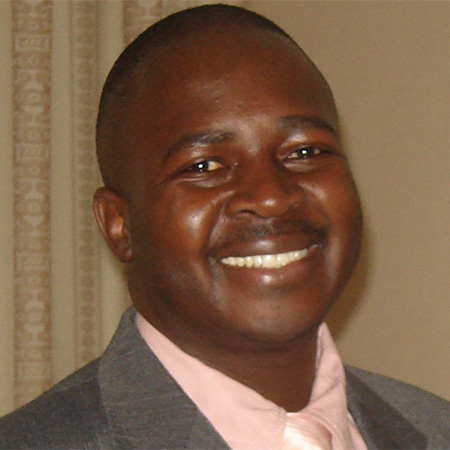
Bekithemba (Themba) Gumbo is a Civil Engineer and holds a PhD in water and sanitation. He is a national of Zimbabwe, and a permanent resident in South Africa since 2001. He was trained in Zimbabwe, England and the Netherlands.
He has more than 20 years of working experience, firstly, during the late 1980’s early 1990’s where he worked for the City of Bulawayo as a water and sewerage engineer. He joined the University of Zimbabwe as a lecturer in 1995. During his ongoing tenure in academia he has been a lecturer, visiting researcher, and external examiner at various institutions and universities in southern Africa. He has published widely in water and environmental management.
In 2004 he worked for the Training and Instructional Design Academy of South Africa (Tidasa) a consulting company based in Pretoria, South Africa. In the beginning of 2005 he joined WaterNet as a Manager, a network affiliated to Cap-Net comprising of 60 university departments, training and research institutes in 17 countries of Southern and Eastern Africa working together to build and strengthen capacity in integrated water resources management.
Before joining Cap-Net in 2011, Dr Gumbo held the position of Project Manager for a Southern Africa Development Community (SADC) regional water demand management (WDM) programme being implemented by the Development Bank of Southern Africa (DBSA).
His passion is on networking, capacity development and empowering young people to take-up a career in water and environmental engineering and management.
Ian Douglas began research at the University of Oxford and completed his Ph.D. at the Australian National University.
His first experience of the tropical hydrology and water resources was in North Queensland, Australia. He then worked in Malaysia in the nineteen sixties, returning in the mid-nineteen eighties to establish a hydrological research programme at the Danum Valley Field Centre in Sabah with which he was involved for 20 years. He was a consultant on hydrology, erosion and sedimentation to the Mekong River Commission and the Science Co-ordinator of the UK’s Natural Environment Research Council’s Lowland Catchment Research Programme that integrated hydrogeological, hydrological and freshwater ecological studies in rivers mainly fed by groundwater.
His books include Humid Landforms (1977), The Urban Environment (1983), Cities: an Environmental History (2013) and (with Philip James) Urban Ecology (2014). Now Emeritus Professor at the University of Manchester, where he was Professor of Physical geography (1979-97) after being Professor of Geography at the University of New England, Australia (1971-78).
He is proud to have had Ph.D. students who are (or have been) Professors at Universiti Malaya, Universiti Kebangsaan Malaysia, Universiti Sains Malaysia, Universiti Tekonologi Malaysia and Universiti Malaysia Sabah.
Contact the Secretariat, Alicia Lim at mycdnet.org@gmail.com for programme and registration details.
- Published in Education, Environment, Events, Past Events
Training of Trainers on Integrated Urban River Basin Management (IURBM)
The Training of Trainers on Integrated Urban River Basin Management was successfully completed on 24 April 2019 in Kuala Lumpur, Malaysia. Organised by the Malaysian Capacity Development Network for Sustainable Water Management (MyCDNet) and the River of Life Public Outreach Programme Phases 3B & 4 , this 2-day event took on a field-based approach to training by first bringing the 30 participants and facilitators on a full-day site visit on 23 April 2019 with five observation stops along the Batu River. The field study began with the first stop at Batu Dam, the upstream of Batu River. As we journeyed downstream, we saw how the urbanisation of the Sg Batu Basin through commercial, residential, industrial, recreational development, and the development of services, amenities and infrastructure that has made this river basin, the type of urban basin it is today. This real-time perspective drew on the experiences, challenges, trials, and tribulations in implementing the River of Life Public Outreach Programme today in the 21st century. The field visit ended at the confluence where Batu River joins up with Gombak River. On the second day, with all that was observed indelibly etched on their minds, the participants could better grasp the theory on the overall concept of Integrated Urban River Basin Management, could better visualise the role and challenges of the local councils, and were more inspired to do their parts in the rehabilitation of our rivers – which is one of the main objectives of the River of Life Public Outreach Programme. Links to training materials and photos: https://drive.google.com/open?id=1lo0ZbYRRvyBo5YsVWPawTptZgwwoY_Hehttps://photos.app.goo.gl/rT3mEsQgUCKGKqzZ7
- Published in Education, Environment, Events, Outreach, Past Events




